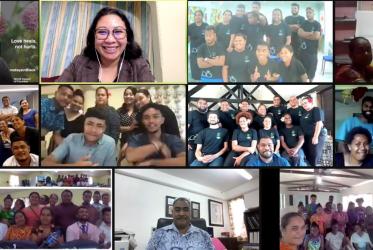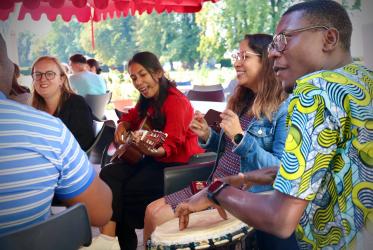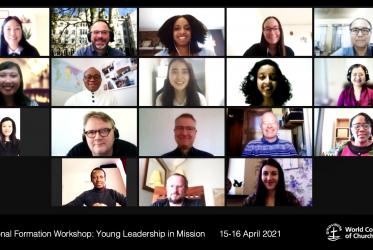Dumaguete City, Philippines
10-14 February 2001
(The following is a slightly abridged version of the report written by the consultation participants.)
I Introduction
Thirty seven participants (13 women and 24 men) from Asia participated in a consultation on "Ecumenical Learning in Partnership" in Dumaguete City, Philippines on 10-14 February 2001. The consultation was sponsored by the World Council of Churches' Education and Ecumenical Formation programme, in co-operation with the United Church of Christ in the Philippines and the Divinity School of the Silliman University. It took place in the framework of a WCC/EEF project on learning ecumenically through congregations and partnerships and exchange.
- in spite of an overall consensus within the ecumenical movement that God’s purpose in Christ is to bring about a new human community of communities and to renew creation, large sections of the church are not wholeheartedly committed to achieving this goal;
- in spite of programmes designed to combat reactionary forces such as capitalist exploitation, male domination, racial discrimination and caste oppression, many churches remain uncommitted to resistance to these systems of injustice;
- in spite of innumerable encounters between churches and congregations, faculty staff and students, real ecumenical learning through such partnerships and encounters has not always happened.
The gathering was therefore an effort to identify, analyze and attempt to overcome the barriers to a real exercise of learning ecumenically in partnership.
A preparatory document was circulated to the participants. Once gathered in Dumaguete, regular morning services expressed the dreams of the overall ecumenical vision, and Bible studies challenged the participants to a wider and contextualized perspective in doing ecumenism.
The participants shared their experiences in ecumenical encounters and partnerships. Dividing into small groups, they examined various models of congregational, institutional, national and international programmes for ecumenical learning through partnership, and attempted to suggest how best to take those models which have worked well a step further, and to envisage new models and programmes.
II The context
Considering that learning between congregations, church districts and regions happens always in context, the consultation attempted to describe some of the factors hindering appropriate forms of ecumenical learning. It said that in order to enhance the catholicity of the church and strengthen its unity, encounter programmes need to tackle these issues:
- Globalization of the market economy and media power has a negative impact on the integrity of churches and institutions. One example is the emergence of charismatic prosperity cult promoters. Another is the development of a consumerist culture among the "haves", while a majority of "have-nots" are not only being denied satisfaction of real needs, but are also unable to satisfy newly-created aspirations. Another result is the development of a culture of individualism, and large-scale labour migration. A new effort to re-affirm identity and a tendency to retreat into ghettos is another reaction to globalization. This quest has a certain legitimacy, but creates insurmountable cultural barriers that hinder ecumenical learning in partnership encounters.
- A peculiar combination of capitalist ideology and religious fundamentalism is fanning hatred of people of other faiths. Many religious fundamentalists are ideologically capitalist, though some may be nationalistic and against global market structures and modes of production.
- The systemic abuse of power and authority in churches and church-related institutions is a big handicap. When opportunities to promote ecumenical learning in partnership are created, it is not uncommon for nepotistic and internal political interests to dictate the choice of delegates. When unmotivated people are brought together as learners, the result can only be unsatisfactory. Undemocratic decision-making processes also dominate the setting of objectives and funding of partnership programmes.
- Male domination in the church and institutional leadership is another barrier to ecumenical learning in partnership. Such leaders do not help to facilitate the empowerment of women. The consultation observed that the Decade of Churches in Solidarity with Women has produced scant results in most churches.
- In many institutions there is a lack of ecumenically minded and trained leaders among the younger generation. This is probably due to the unwillingness of senior leaders to share power and delegate authority. Ecumenical learning programmes provide few opportunities for youth participation. Thus, more and more young people are unable to identify with the ways the ecumenical agenda is set.
- Institutionalization which, on the one hand, guarantees continuity, helps channel resources and monitor their utilization often, on the other hand, acts as a dampening influence, curbing dynamism and new initiatives.
- Ecumenical learning cannot happen without proper communication. At present, mass communication hardware is unavailable to the poor, who do not have access to these tools even as receivers.
III Affirmations
Having identified the above problems, the consultation observed that the ecumenical movement is often unable to live up to its own vision and that, in many cases, it has become a "routine movement" devoted mainly to securing vested interests.
Participants therefore made the following affirmations:
- Programmes like the Ecumenical Decade of Churches in Solidarity with Women, the Programme to Combat Racism (PCR), or the facilitation of peace initiatives have all promoted considerable ecumenical learning by bringing people together to share across boundaries. Efforts to defend the rights of Indigenous peoples, including their right to self-determination, have led to the creation of advocacy platforms that contribute to a wider understanding of the churches' ecumenical task., while those involved have learned ecumenically and aquired deeper insight into the suffering and hopes of people of other cultures and traditions.
- In spite of the wide variety of encounters organized in the context of the Decade of Churches in Solidarity with Women, there is still a significant lack of ecumenical awareness. Equal opportunities, equal status, and recognition for their unique contribution to social life in general and to the churches in particular, is still a far-off dream for most women. Some exceptions to the rule include churches like those in the Philippines which now have a larger proportion of women in leadership. It seems that some churches at least have worked out their traditional bias against women as inferior beings.
- By raising awareness about the effects of racism, casteism, oppression of women, and economic globalization (in rural as well as in urban settings), encounter programmes have helped to internationalize local experiences and, thus, to attract solidarity.
After assessing existing models to discern what works and what needs to be altered, the consultation tried to identify whether new contexts demand new models and methodologies in ecumenical encounters.
Two basic models of encounter were identified: internal encounters within a region or a country, and encounters and partnerships that cross country, church or continental boundaries. Obviously, cultural awareness as well as language affects how the encounter is classified.
Encounters tended to be either issue-centred, whether short- or long-term (partnerships), accredited programmes or faculty development programmes.
V Insights: what has worked well and what has not
The consultation commented on the following models:
- The immersion-incarnation model has proved to be effective, but has sometimes been implemented in a token and partial manner. The methodology needs to be applied at the local, community level. Ecumenical learning encounters like internship programmes that provide opportunities to learn from the poor, or from people of other faiths contribute to the growth of solidarity with the oppressed and to a deeper commitment to ecumenical learning. The fact that immresion-incarnation programmes contribute to leadership formation on the local level as well as for those "exposed" is one of the benefits of this model.
Before anyone is afforded an opportunity for ecumenical exchange encounter outside his/her own culture, a careful evaluation should be made as to what learning in partnership has already taken place in the candidate's own context. This will ensure that only potential real learners are provided with opportunities to widen their horizons and to use the learning to facilitate others.
Clear definition of objectives and goals prior to commencement will help avoid overburdening local hosts in the hosting region.
- Faculty and student exchange programmes are another model of ecumenical encounter. Many theological institutions have long-established student exchange, faculty exchange and internship programmes that are essential in order to prepare future ecumenical leadership. Could more resources be set aside to facilitate people to people encounters in addition to existing exchange programme among theologians? For example, could a group of Dalits meet a group of Minjung to share their stories and plan common strategies rather than bringing Minjung theologians and Dalit theologians together? The quality and effectiveness of ecumenical learning in partnership programmes could be greatly enhanced if the following points were given careful attention: - carefully structured preparation to ensure that learning in partnership in the candidate/students’ own context has taken place; - preparation for re-entry back to the student's own original context; - a deliberate plan to share what has been learned with the sending church/group/institution; - continuous monitoring and follow-up of the interns/faculty/church workers, agreed upon and implemented by both the sending and receiving bodies.
- Solidarity and advocacy action model: Advocacy and lobbying, for example, for third-world debt cancellation, to abolish child labour, to fight against child abuse, child prostitution and trafficking of women, among others, has provided ecumenical learning experience sfor large groups of people across national and international boundaries.
- Interfaith dialogue has been a long-standing way of promoting better understanding between and among people of different faits. However, rather only than facilitating formal dialogue, opportunities should be created for working together in conflict resolution, in advocacy for human rights, in income-generating activities... This may reduce defensive attitudes and provide opportunities for spontaneous faith-sharing; the approach applies as well for intra-Christian faith relations.
- Story-sharing: Encounters often take place between different cultures. When that happens, sensitivity is vital to ecumenical learning. For example, rural people often communicate orally, and much is communicated through ritual. It is difficult for partners from non-oral cultures to discern what is being communicated. However, the way to help the latter to learn is not to conceptualize the ideas enshrined in the stories, but rather to help them discern the holistic approach of non-oral communication. In order to make sure that poor people's stories do not get retold by vested interests to the advantage of the latter, the stories should be well entrenched in rituals.



